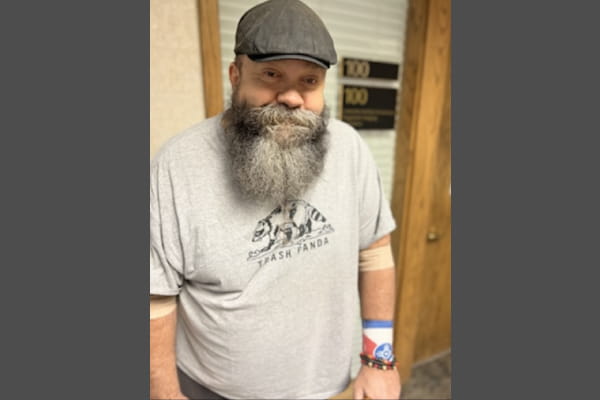"I felt like I was going to die," says Gary, who after four days called an ambulance to transport him to Ascension Via Christi St. Francis. "When I got to the hospital, I found out I was right. I was near death, but not from COVID."
Instead, the now 57-year-old Wichitan was diagnosed with aplastic anemia, a rare blood condition that occurs when your bone marrow cannot make enough new blood cells for your body to work normally. Although not a cancer, cancer specialists typically treat it using therapies similar to those used to treat leukemia and lymphoma.
Gary, who could no longer afford health insurance after his premiums tripled in 2017, was uninsured and scared.
"When you first get diagnosed and they start talking about treatment and the drug you need costs a quarter of a million dollars, it's very frightening," he says.
But thanks to the coordinated efforts of medical oncologist, Pavan Reddy, MD, oncology nurse navigator, Kayla Frazier, oncology pharmacist Jatandra "J.T." Birney, and Ascension Via Christi's participation in the federal 340B Health Drug Pricing program, Gary received the four infusions of the drug he needed as an outpatient.
In doing so, the cost of the drug went from more than $250,000 to less than $5, making it affordable for both Gary and the hospital.
"I'm quite certain that it saved my life," says Gary.
A life twice saved
The infusions helped for a year and a half as he worked with his care team to improve his blood counts and manage a disease that causes him to suffer lapses in memory, mood swings, sleep disruptions and crippling leg pain.
"Then all of sudden my platelets just started tanking again," he says, and once again he required infusions with the same pricey drug. His care team wanted to utilize the 340B program once again, but there was a hitch.
Because patients can experience serious reactions, they must remain close to the hospital so they can be closely monitored while receiving the medication therapy. But Gary, now on disability, had moved his mobile home to a friend's land 90 minutes outside Wichita to save costs.
So Birney, his inpatient hospital pharmacist, consulted with Frazier, his nurse navigator, to leverage another program: A recently renewed American Cancer Society lodging grant to Ascension Via Christi. The grant, designed to remove obstacles to care for patients being treated for cancer, paid for Gary's stay at a nearby hotel, allowing him to once again access the life-saving infusions he needed over a four-day period.
"Without him being able to stay close, it would not have been possible for him to receive the infusions," says Birney. "But if he was an inpatient, we could not have leveraged the savings that the 340B program provides."
Thanks to his most recent treatment in July, Gary is back home and continues to work with Dr. Reddy to manage his disease.
"I live with very low blood counts because aplastic anemia causes all your chemicals to be out of balance," he says. "But with this last treatment, I was feeling the positive effects way sooner."
And, he says, he is still alive thanks to the entire team's efforts on his behalf.

